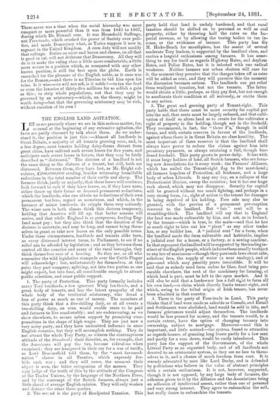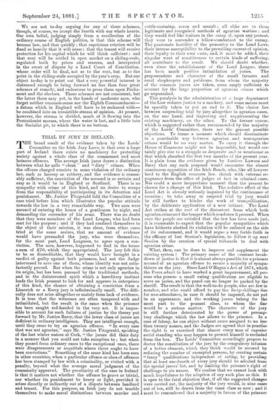THE ENGLISH LAND AGITATION.
T.1 ET us see precisely where we are in this serious matter, for, as usual at the beginning of any extensive agitation, the facts are partly obscured by talk about them. As we under- stand it, the position is just this :—Almost all landlords in Great Britain, a majority of all tenants growing corn, and, in a less degree, most tenants holding dairy-farms distant from great cities, have suffered such severe losses for five years, and anticipate such severe losses in future, that they may be fairly described as "distressed." The distress of a landlord is not the same thing as the distress of a tenant, but still, both are distressed. Between them, they have lost, as Mr. Bright cal- culates, £200,000,000 sterling, besides witnessing formidable reductions in the total number of their cattle and sheep. The farmers think, justly or unjustly, that those losses will continue, look forward to ruin if they have leases, or, if they have none, either throw up their farms or demand permanent reductions, which the landlords, who can obtain no reductions of their own permanent burdens, regard as monstrous, and which, in the instance of minor landlords, do cripple them very seriously. The wiser men in both classes think this distress temporary, holding that America will fill up, that better seasons will arrive, and that while England is so prosperous, feeding Eng- land must pay ; but they also think that the duration of the distress is uncertain, and may be long, and cannot bring them- selves to grant or take new leases on the only possible terms. Under these circumstances, landlords and tenants alike turn, as every distressed interest turns, to Parliament, to see if no relief can be afforded by legislation ; and as they between them control all the counties and many of the rural boroughs, they think themselves sure of a hearing. So they are, as all who remember the wild legislative stampede over the Cattle Plague will acknowledge ; but, unfortunately for themselves, at this point they part company, splitting, not into two parties as one might expect, but into four, all considerable enough to attract public attention, and some public support.
1. The party of Protection. This party formally includes many Tory landlords, a few ignorant Whig landlords, and a great body of tenants, and has the latent sympathy of the whole body of the territorial aristocracy, who dread a loss of power as much as one of money. The members of this party think that a five-shilling duty, or at all events a ten-shilling duty, on corn would enable rents to be paid and farmers to live comfortably ; and are endeavouring, as we show elsewhere, to secure urban support by promising com- pensations in the shape of high wages. They are just now a very noisy party, and they have undoubted influence in some English counties, but they will accomplish nothing. They do not attract the whole Tory Party, as witness the contemptuous attitude of the Standard; their theories, as, for example, that the Americans will pay the tax, become ridiculous when examined ; they are hampered in their cry for a war of tariffs, as Lord Beaconsfield told them, by the "most favoured- nation " clause in all Treaties, which expressly for- bids such war ; and they will rouse, the moment their object is seen, the bitter antagonism of the masses. They may judge of the truth of this by the attitude of the Congress of the Trades' Unions, by the language of the Northern Press, and by the contempt of the Scotch farmers, always just a little ahead of average English opinion. They will only weaken and distract the other three parties.
2. The seccnd is the party of Readjusted Taxation. This party hold that land is unduly burdened, and that rural taxation should be shifted on to personal as well as real property, either by throwing half the rates on the Im- perial revenue, or by allowing the taxing bodies to tax in- come, or the evidences of income. This party has Sir M. Hicks-Beach for mouthpiece, has the assent of several moderate Tory leaders is supported by the landlord class, and excites a languid enthusiasm among farmers. It has some- thing to say for itself as regards Highway Rates, and Asylum. Rates, and Police Rates, but it is infected with one radical weakness. Neither farmers nor urban electors will care for it, the moment they perceive that the charges taken off as rates. will be added as rent, and they will perceive this the moment the discussion becomes serious. The landlords can get relief from readjusted taxation, but not the tenants. The latter would obtain a little, perhaps, as they pay first, but not enough to ameliorate their condition at all seriously, or excite them. to any action.
3. The great and growing party of Tenant-right. This party holds that there must be more security for capital put into the soil, that rents must be largely reduced, and that culti- vation of itself so alters land as to create for the cultivator a right of property in the holding, though not in the freehold..
They recommend, in fact, the "three F's," though in mild forms, and with certain reserves in favour of the landlords,. against whom there is in Great Britain no class hostility. The most important of these reserves is that the landlord shall always have power to reduce the claims against him into pecuniary payments, so always retaining a full, though bur- dened freehold. This party grows in power daily. It has with it some large holders of land, all Scotch farmers, who are form- ing new Associations for it every week ; the Farmers' Alliance,.
which has nailed the Tenant-right flag to the mast-head; all farmers hopeless of Protection, all Irishmen, and a large body of urban Liberals. It may any day, on a collapse of the Protectionist illusion, sweep the counties ; but it has one huge rock ahead, which may not disappear. Security for capital will be granted without too much fighting, and perhaps in a
very strong form, i.e., right of action to the tenant for damages
in being deprived of his holding. Free sale may also be. granted, with the proviso of a permanent pre-emption reserved to the landlord. But " fair " rent will be a.
stumbling-block. The landlord will say that in England the land was made culturable by him, and not, as in Ireland, by the tenant—which is true, in the main—and that he has as much right to hire out his " plant " as any other trader has, or any builder has. A "judicial rent" for a farm, when
the landlord made the farm culturable and habitable, implies a judicial rent for a house' or a factory, or a sewing-machine.. In that argument the landlord will be supported by thotrading in-
stinct of the English people, which induces them usually to object to any law of maximum--though they pass such laws about cabs, solicitors' fees, the supply of water (a near analogy), and of gas—and which may possibly prove irresistible.- It will be said that as nobody need farm unless he likes, food being pro- curable elsewhere, the rent of the machinery for farming, of which land is part, must be left to the open market. And it will also be said that a landowner has a full rig'at to farm all' his own land,—a claim which directly limits tenant-right, and which, owing to the tribal origin of Irish tenure, has never been admitted in that country.
4. There is the party of Free-trade in Land. This party thinks that if land were made as saleable as Consols, and Entail and Settlement were abolished, land would be sold in bits, and. farmers' grievances would adjust themselves. The landlords would be less pressed for money, and the tenants would, to a certain extent, have the option of changing tenancy into. ownership, subject to mortgage. Moreover—and this is important, and little noticed—the system, found so attractive. as regards houses, of granting long leases partly for a low rent and partly for a sum down, would be easily introduced. This. party has the support of the Government, of the whole Liberal Party as an organised body, and of all landlords not devoted to an aristocratic system, as they see no loss to them- selves in it, and a chance of much freedom from care. It is. warmly advocated by men like Lord Derby, and is defended by politicians who believe in the value of abstract principles. with a certain enthusiasm. It is not, however, supported, though it is not opposed, by any large body of farmers, the- adhesion given to it by the Alliance and the Associations being an adhesion of intellectual assent, rather than one of personal and very strong interest. They agree to enfranchise the soil,. but really desire to enfranchise the tenants.
We are not to-day arguing for any of these schemes, though, of course, we accept the fourth with our whole hearts. Our own belief, judging simply from a recollection of the ordinary course of English politics, is that this scheme will become law, and that quickly ; that capricious eviction will be fined so heavily that it will cease ; that the tenant will receive protection for his capital which he will think sufficient ; and that rent will be settled in open market on a sliding-scale, regulated both by prices and seasons, and interpreted in the event of dispute by a Land Court of Conciliation, whose order will be final, not as to the rent, but as to the point in the sliding-scale occupied by the year's crop. But our object to-day is to point out that a very powerful interest is distressed enough to .bring forward no less than four great schemes of remedy, and endeavour to press them upon Parlia- ment and the electors. Those schemes are not consistent, but the latter three may yet, in the hands of moderate men, who forget neither common-sense nor the Eighth Commandment— a datum which in England will have to be reckoned with— be combined into an irresistible stream of opinion. At present, however, the stream is divided, much of it flowing into the Protectionist morass, where the water is lost, and a little into the Socialist pit, to which there is no bottom.































 Previous page
Previous page